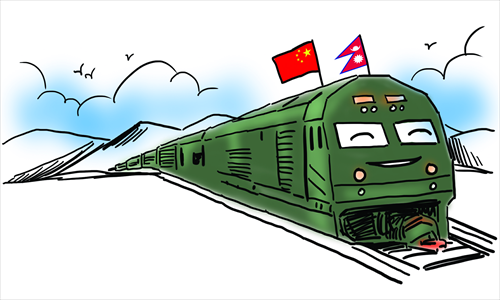Sino-Nepalese rail route offers rays of hope

Illustration: Liu Rui/GT
Many Nepalese were ecstatic over the recent opening of the Lanzhou to Xigaze China-Nepal rail-truck route. The route saves businesses money, but just as important is that this railway line relieves Nepal from being solely dependent on India for the transportation of international goods. The train that arrived loaded with goods furthered the hope and anticipation of the Nepalese of a true railroad link with China.
A cross-border railroad link to the Rasuwagadhi area has already been discussed between the two countries. In China the railroad is expected to reach the Nepal border by 2020.
When the railroad reaches to Nepal, it would be the most convenient if Nepal could also build a good railroad to Rasuwagadhi. The Rasuwagadhi border point is a reasonable distance from the capital city of Nepal, Kathmandu. The Rasuwa district is also a very popular site for tourists and lies among pilgrimage routes. As it is not very densely populated, empty land is available and accessible for construction of the railway track and rail stations.
In addition, the ethnic communities that reside in the Rasuwa Mountains and valleys are Sherpas and Tamangs who share cultural and family ties with Tibetans on the other side of the border.
The 106-kilometer-long Pasang Lhamu Highway already connects the Rasuwagadhi border to China from Galchi, setting a precedent for another link. This road has been operating from the sixth century for trade between Tibet and Nepal. Kings in Kathmandu Valley traded with Tibet via this road to the west and with Kuti (Nyalam) to the east.
In those days, Nepal exported food, silver, chili pepper, spices and garlic, and imported wool, cloth, gold and salt. This is the same road from where the Chinese aid was transported to Nepal when the latter suffered from fuel scarcity due to the Indian blockade last year. In that context, the Parliamentary Development Committee has proposed upgrading various sections of the route. All these road connections suggest that situating a railroad building along the Trisuli River bank in Nepal is a favorable position.
Northern Nepalese will be the first-hand beneficiaries, but as the biggest markets in Nepal are in the south, the benefits will also flow to the other half of the country. There is also the possibility of connecting China to India via this railway line. From Rasuwagadhi to Birgunj is only 240 kilometers, after that the adjoining part is Bihar, India. Since the rail route greatly reduces the distance with the bigger economy of China, people in southern parts are hopeful. For Bihar, trade with China will be easier along this route than through Kolkata, saving time, cost and distance.
The cargo train is seen as a symbol that China will stand decisively on her words and will provide a transit permit for landlocked neighbor Nepal. After railroad building, the transit for international goods will, of course, be easier. Nepal is also making efforts to extend and upgrade the highway to the Kerung boarder. In this fiscal year's annual policies and program, the government prioritized the program and recently opened the tender for upgrading the highway.
There are some challenges, especially geographically. Last year's earthquake and its concomitant landslides resulted in comprehensive and extensive damages to Nepal's infrastructure. But these challenges are not insurmountable if Nepal is firmly determined to build this railroad connection.
Another challenge is both internal and external stakeholders' sensitivity about mega infrastructure projects. Unfortunately due to oversensitivity, some major projects were aborted before even a brick was laid. So the Nepali government must play a key role in bringing all the stakeholders into a sufficient consensus.
The railroad connection to China not only is important for Nepal and Nepalese people's future development, but also has the capacity to build connectivity with the whole of South Asia. The government of Nepal has the chance to make history.
The author is a PhD student of international relations at Yunnan University. opinion@globaltimes.com.cn